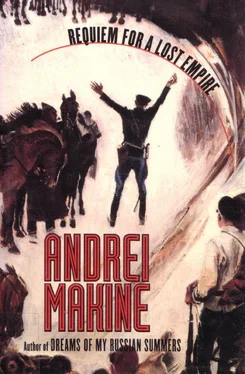The evening of the private viewing in Berlin seemed infinitely remote. And yet scarcely three years had elapsed. I had a vision of the faces that were reflected then in the nickel-plated surface of the toy launched by that man with the forced laugh of a fairground barker. The dark-haired young woman swooning in front of a pallid canvas. Shakh speaking to the philatelist. And also the man who had succeeded in kicking away the top with the tip of his patent leather shoe. I had later chanced to pass the woman in a restaurant: in conversation with a friend, she was commenting on the menu and her descriptions were just as enthusiastic as the one she had earlier reserved for the picture. So she was less hypocritical than I had thought, I said to myself, just a little excessive in her praises. The philatelist continued to spend more than half his life in his shop piled high with stacks of stamped envelopes and albums, without having the least suspicion that he had entered our world of espionage for a few hours and left it again, unaware of what was happening to him. As for the man who had changed the trajectory of the spinning top by giving it a little kick, two years later he had lost his post as first secretary to a Western embassy in East Berlin, on account of an amorous liaison. It was Shakh who had told us of this misadventure. "He was not a novice, he knew that bed is the best trap for a diplomat. But it's a little like dying, it's something that only happens to other people." We thought the story would stop there: the tale of one of those stupid men in their fifties who swallow the amorous encounters set up for them hook, line, and sinker. But there was a detail that made Shakh continue. There was in his voice a chess player's fascination for an elegant series of moves. "The scenario was of a pathetic banality.
Even in intelligence schools I don't think they give such obvious examples any longer. On the other hand, as regards psychology, hats off to our East German colleagues. Here's how it was. The diplomat makes the acquaintance of a young Aryan beauty, falls for her, but remembers the need to be prudent. He hesitates. The young woman introduces him to one of her friends. Younger still and even more irresistible. The wretched diplomat doesn't resist. The first girl treats him to a terrible scene of jealousy and leaves him forever. Now he's completely reassured: have you ever seen a jealous female spy? Confident of his charm, he forges ahead. The sequel is an ultra classic case, even the subsequent reaction of his wife-and this scared him more than his own country's legal sanctions…"
After the house search that day it was you who talked about the ghosts reflected in the brilliant spinning of a top. You knew that after all those hours, when our deaths could have been caused by one word too many or a gesture that might have annoyed the soldiers, what we needed was to move, to talk, to laugh about that diplomat who was ready to sell all the secrets in the world, provided his wife did not learn of his misconduct. As you talked you were putting our house back in order, filling the gaps that had been left by the objects carried away.
I listened to you distractedly, conscious that it was not the substance of these stories that mattered. In the gleaming top I could see a young man in a dark suit, a glass of champagne in his hand. This self of mine that looked like a brilliant caricature, with his lust for living, his feverish anticipation of the new life, his haste to immerse himself in the seductive complexity of the Western World, with a pistol in his armpit and an ice-cold glass in his burning hand.
Our life had rapidly erased that caricature, turning as it did into an exhausting hunt for men who manufactured death. Those who invented weapons in the sheltered comfort of laboratories, those at the highest levels who made decisions about their production and later their use, those who sold them and resold them, those who killed. From this human chain all we needed was to seize upon just one tiny link of information, an address, a name. And it was often in countries at war that the chain could be uncovered most easily. We would settle there under one identity or another (in that African city we were representatives of a geological prospecting company), we would endeavor to meet the person who was supplying arms to feed the imminent fighting. "Fighting that very likely wouldn't break out if there were not all these means of killing," I said to myself, two days before the start of the massacres, as I was talking to an arms salesman about to catch a plane to London. In the early days I used to think it would have been simpler to shoot down this Ron Scalper, him and his like, they were so palpably insignificant compared with the carnage that resulted from their trade. But this desire had been left behind among the fantasies of that young man with his glass of champagne in the middle of a Berlin gallery. In reality one had to cherish this salesman with all possible solicitude, for he was the first link that could uncover the whole chain. At the airport he had given me his London address-our next destination.
We went on joking, so as to forget the few hours we had lived through, when death was sickeningly promiscuous. You observed that a man who feels himself to be seductive becomes very nimble, like the diplomat with the patent leather shoes, slipping his foot between the legs of the other guests and deflecting the top with the adroitness of a soccer player. I told you about my impulse to kill the arms salesman I had accompanied to the airport two days earlier and my regret that such radical solutions are only effective in spy films. Picking up the books that the soldiers had flung to the ground during their search, I went over to the window and caught sight again of their ill-starred comrade lying in the road and of two furtive figures who emerged from a side street in the already encroaching dusk, went over to the corpse, picked up its booty scattered in the dust, and disappeared into their hole. You came and stood beside me, noticed a detail I had missed, and murmured with a smile, "Look, our album."
It was a big photograph album that the robbers of the dead man had left behind when they carried off the lamp and the clothes. An album in which the snapshots, cunningly contrived and carefully arranged in order, were designed to confirm the identity we were living under at that time: a couple of Canadian prospectors in charge of a geological search. Family photos, of a family that had never existed, with no other reality than that of these smiling faces of our purported nearest and dearest and of ourselves, in the settings of vacations or family reunions. This reconstruction had, of course, been made not for the benefit of looters in a hurry but for scrutiny by professionals, such as we had already had occasion to undergo during those three years. Tucked away in a dusty corner on a shelf, this album, with its cheerful aura of routine married life, was more convincing than the most carefully fabricated life story. Now it lay beside the soldier's body in this half-burned city, and what was strangest of all was to picture one of the townspeople leafing through it one day, believing it was a real family history, endearing at every stage, with all those sentiments that constantly recur, and the children growing up from one photo to the next.
Later on, during the night, I would sense that this past, photographed but never lived, aroused in you a memory of ourselves, of our actual life together, that we paid such little attention to under our borrowed identities. Our life had left behind no photos, no letters, had led to no exchange of confidences. Suddenly the counterfeit album reminded us that we had had these three years of routine complicity, an imperceptible closening of ties, an affection we avoided calling love. Far away there was our country, the weary empire whose physical mass we were ever aware of as the magnet that drew our thoughts, even through the African night. There were its scents and its winter smoke above the villages, the snows in its little towns, mute beneath the blizzards, its faces scarred by forgotten wars and exiles with no return, its history, in which the victorious din of sounding brass often gave way to weeping, to a silence cadenced by the tramp of a column of soldiers after a defeat in battle. And, buried deep in this snow and those muddy roads, there were the years of our childhood and youth, inseparable from the pulse of joy and sorrow, from that living alloy that we call our native land.
Читать дальше










